ESTRATÉGIA DISCURSIVA DA DITADURA CIVIL-MILITAR BRASILEIRA (1964-1985): A LEGITIMAÇÃO ATRAVÉS DA ESCOLA
DOI:
https://doi.org/10.23925/2176-2767.2019v66p115-144Palabras clave:
Ditadura Civil-Militar. Escola. Livro DidáticoResumen
O patriotismo exagerado; o ‘bem comum’; o patrulhamento ideológico; o recurso à autoridade; as horas-cívicas; as ‘datas cívicas’... Essa gramática fez parte da escola brasileira durante o período da ditadura civil-militar (1964-1985), materializando o discurso que tornou legítimo o estado de exceção na crença de grande parte da população. Assim, a proposta do texto é discutir a escola enquanto um meio de operacionalização do discurso da ditadura no Brasil, mapeando algumas conotações desse discurso no campo educacional. Adotando uma metodologia analítico-reconstrutiva, a pesquisa baseia-se na análise de um corpus empírico constituído por um conjunto de 12 (doze) livros didáticos utilizados nas escolas brasileiras durante o período em estudo. Como conclusão, o texto reforça a ideia que, através da escola e dos conteúdos dos livros didáticos, a ditadura reforçou o seu discurso de legitimação.
Descargas
Publicado
Cómo citar
Número
Sección
Licencia

Este obra está licenciado com uma Licença Creative Commons Atribuição 4.0 Internacional.




